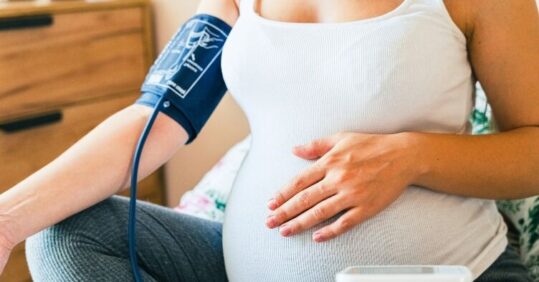Monitoring blood pressure at home reduces heart attack risk in new mums

Self-monitoring of blood pressure after pregnancy and birth is more effective than traditional blood pressure monitoring for new mothers, a new study has shown.
Researchers from the University of Oxford found that women who had experienced hypertension during pregnancy and who measured their blood pressure every day at home and then received subsequent medication advice could reduce their blood pressure to a greater extent than women who were treated conventionally.
As a result, new mothers who self-monitored their blood pressure after giving birth improved blood pressure control for the first year after a hypertensive pregnancy and decreased their risk of heart attacks, strokes and heart disease.
Related Article: Lower stroke survival odds faced by people in poorer areas
The study, funded by the British Heart Foundation (BHF), was published in the Journal of American Medical Association (JAMA) and was presented at the American Heart Association’s Scientific Sessions in Philadelphia.
The researchers hope the findings could be the first step towards the prevention of future heart problems for women who experience hypertension during pregnancy.
Cardiovascular disease remains the leading cause of women’s deaths during and immediately after pregnancy in the UK, and complications experienced during pregnancy can have a life-long effect on women’s cardiovascular health. Worldwide, around ten per cent of women are treated for hypertension during pregnancy, where blood pressure becomes too high (140/90 mmHg or higher). Of these women, approximately one-third will start treatment for high blood pressure in ten years following their pregnancy and have a significantly higher long-term risk of heart attack, stroke and heart failure.
The researchers identified 222 new mothers who had developed high blood pressure during pregnancy. One group of women were treated in a conventional way, which involved a blood pressure review with a community midwife around ten days after giving birth and a review at six to eight weeks with their GP.
A second group of women were treated through self-monitoring. These women took a blood pressure reading daily at home and recorded it in a smartphone app. They then received advice based on their reading to either reduce, maintain or increase their dose of blood pressure-lowering medication. All the women in the study were followed up for nine months after giving birth.
Around eight months after giving birth, most of the self-monitoring group had been able to stop taking their blood pressure-lowering medication, and the average blood pressure was lower than in the conventional care group at 126/82mmHg compared to 131/86 mmHg, respectively.
Related Article: Be alert to pancreatitis in patients using GLP-1 weight-loss drugs
The researchers say that reducing blood pressure by as little as 5mmHg can delay the development of high blood pressure by many years. Over a lifetime, this can reduce the risk of heart attacks by 20 per cent and strokes by 40 per cent.
In addition, post-pregnancy hospital admissions were reduced in the self-monitoring group, with just eight re-admissions for blood pressure-related issues in the two weeks following discharge. This was compared to 29 in the group treated conventionally, highlighting how self-monitoring could relieve some pressure on NHS care.
Dr Jamie Kitt, from Oxford University, said: ‘Our earlier research identified a critical six-week window after a hypertensive pregnancy to ‘reset’ a new mother’s blood pressure and reduce their risk of future heart problems. This study shows us how we can achieve this reset. As we investigate the best way to provide this care on a large scale, we hope our findings will act as a reminder to healthcare professionals and encourage them to keep a close eye on the new mothers under their care after they have been discharged from hospital.’
Dr Sonya Babu-Narayan, BHF Associate Medical Director and consultant cardiologist, added: ‘This study shows that empowering women with the right knowledge, tools and medical support after a hypertensive pregnancy leads to better blood pressure. These encouraging findings suggest self-monitoring blood pressure could even stop future heart attacks and strokes, and we look forward to understanding how this approach could benefit women in the long-term.’
Related Article: Women less likely than men to be treated for heart condition
A larger trial is set to begin next year to assess how best to deliver blood pressure self-monitoring to more women who experience hypertension during pregnancy.

See how our symptom tool can help you make better sense of patient presentations
Click here to search a symptom




